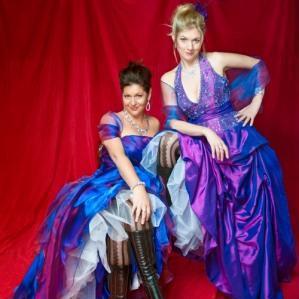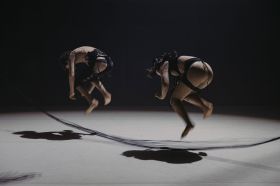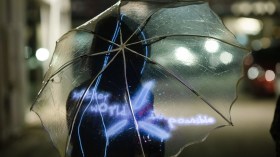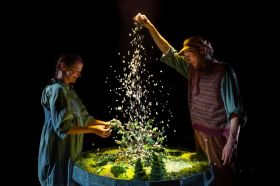A spot of research reassured me further. Chamber Jam provides a showcase for emerging classical musicians, and has done so for several years. I wish I’d known about it earlier, for I have now marked the last Monday of each month in my diary as Chamber Jam night. It’s a brilliant idea, and if this month’s offering was any guide, a well-realised one.
Each of the three acts had its own half-hour spot. First up was a new duo: classical guitarist Duncan Gardiner and mezzo-soprano Annabelle Southern proved to be the ideal warm-up act, with a cosy, informal approach that hinted at the chamber part of the gig’s title.
Take Gardiner and Southern back a century and their material would have been lieder. Today we’d probably call their repertoire art songs: true duets between vocalist and instrumentalist. The opening number, ‘O Willow Waly’ gives the impression of being an English folk song, but in fact it was written for the 1961 British horror film The Innocents (based on the Henry James novella The Turn of the Screw) by French composer Georges Auric. It has been described as a ‘creepy’ song, and indeed it is, no doubt due to its use of the augmented 4th – the tritone or ‘devil’s interval’.
The duo paired this number with a genuine folk-song, the ever-popular ‘Scarborough Fair’. They managed to make this one creepy as well. Perhaps this was due in part to its association with the Auric song, but the slow tempo and the bleak guitar arpeggios certainly helped, as did Southern’s unique voice – sometimes tending towards a piercing scream in the upper register, yet breathy on the lower notes, with the whole enhanced by a pronounced vibrato. The effect was indeed creepy, and ideally suited to its position in the program.
The other four items, all love songs and Gardiner’s own compositions, brought a change of mood. The composer moved confidently from guitar to piano and back again, his skills enhanced by the two fine instruments at his disposal. While having a distinctly lyrical and melodic bent, Gardiner’s work carries interesting hints of atonality – reminiscent, perhaps, of Scriabin. One of the songs, ‘Incense and Araby’, was ideally suited to the true mezzo range and Southern’s voice served it especially well. The final song, ‘Spider Jack’, while not exactly a love song in the accepted sense, gave us a rousing finale with its formula for happiness.
A short break for one of the Ellington bar’s amazing cocktails led us to part two – the equally amazing duo Divalicious. This is also a new pairing, composed of Penny Shaw and Fiona Cooper Smyth, but to call these two ‘emerging artists’ is stretching the point a bit. They are both well-schooled, highly experienced opera singers, having performed most recently with the WA Opera but coming from a background in the industry that has fitted them to tackle almost anything. Experience shines through in their confident showmanship and sense of timing – in the performing, rather than the musical, sense of the term. Although, let’s face it, their musical timing is also perfect, as is every other facet of their craft, as far as I could tell from this offering.
With the brilliant David Wickham at the piano, what was there not to love about this act? They got off to a rollicking start with an arrangement of Orff’s Carmina Burana in which they told us all about what they were going to do, and then they immediately got on with doing it.
“It” was a taste of one operatic chestnut after another, in a sequence that included gems by Mozart, Offenbach, Puccini, Verdi, Handel, Lloyd Webber – and ABBA! – sung in the original languages but performed with belly dance shimmies and slapstick in ways their composers could never have imagined. The sight of two glamorously dressed, attractive ladies bopping to the Alleluia Chorus has to be seen to be believed.
The whole thing could so easily have been a quasi-undergraduate romp; a send-up of all that opera buffs hold sacred, but it was saved from that fate by the sheer artistry of the performers. The three artists – and I include Wickham here, because far from being a mere accompanist, he was an integral part of the act, even giving us a virtuoso piano break while the two sopranos took a few much-needed deep breaths – moved us from riotous laughter to deep melancholy and back again, yet always with a light touch. This is an act that could take the performers a long way. I harbour a secret wish to see them tackle the Ring Cycle. While Wagner might be outside their comfort zone, I think Anna Russell would look down from heaven and cheer them on. Divalicious rocks! What more can I say?
Another quick break preluded the final act of the evening. The only way to follow Divalicious would be something so different as to be from another world, and we got that with Basement Saxx. This is a 12-player ensemble of saxophone students from WAAPA and UWA under the baton of Matt Styles, with a repertoire as broad as Perth Water. Their blurb tells us to expect ‘everything from Debussy to Celtic reels’ but that hardly begins to touch on the incredible flexibility of this talented group. The saxophone is, of course, a very versatile instrument, which is its greatest strength. It is also its greatest weakness, because it is neither fish nor fowl when placed alongside true brass and woodwind instruments. Yet it can mimic the human voice and depict human emotion in a way no other instrument can, and this was demonstrated to the full by Basement Saxx.
Their opening number, Alun Cook’s ‘Boris goes to Dublin’ did not feature a soloist, as is usual with this item. This is typical of Basement Saxx’s approach. With a nice blend of baritone, tenor, alto and soprano instruments and clever arrangements that highlight each performer’s talents without encroaching on the team-like nature of the group, Basement Saxx serves a gallant purpose in highlighting the depth of talent available in WA, just on this one suite of instruments. In a sense, every player is a soloist – players of each section are deliberately not in unison, which delivers a rich blend of 12 individuals, each with his or her own part. So it matters little whether a player is a first year student or post-graduate: each is “a piece of the continent, a part of the main”.
I particularly enjoyed their version of Debussy’s ‘Golliwog’s Cake Walk’, always a slightly jokey piece. This arrangement, with its hints of animal sounds that only a sax could essay, is a winner.
I must admit I was a bit worried about the idea of subjecting relatively inexperienced performers to the mercies of a club audience, but this was not your usual drinking, eating, chatting club crowd. They were respectful of the artists and judging by conversations at the bar, genuinely interested in the furthering of new talent. The entire evening was held together by the admirable compering of Stephen McAllen, chorus administrator of the West Australian Symphony Orchestra, and kudos is also due to North Street Music, whose task it is to put each Chamber Jam program together.
Rating: Four stars
Chamber Jam, September 2011
Ellington Jazz Club, Northbridge, Perth
September 26






